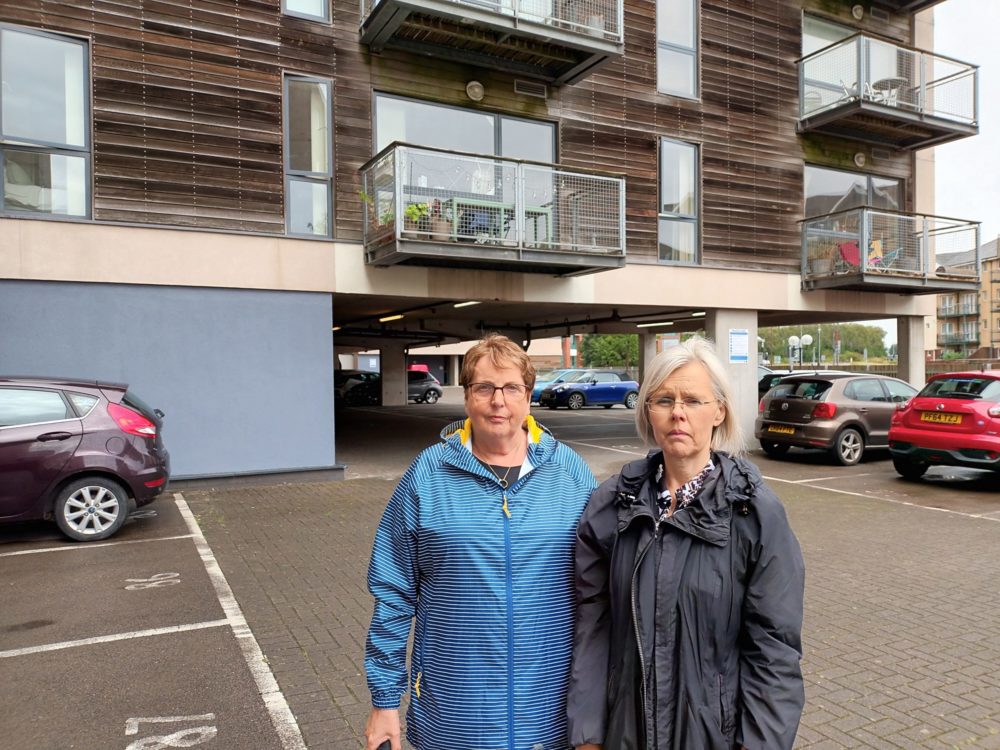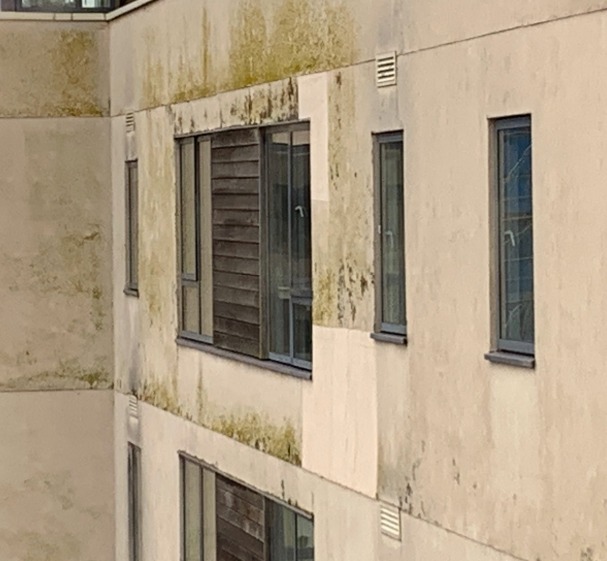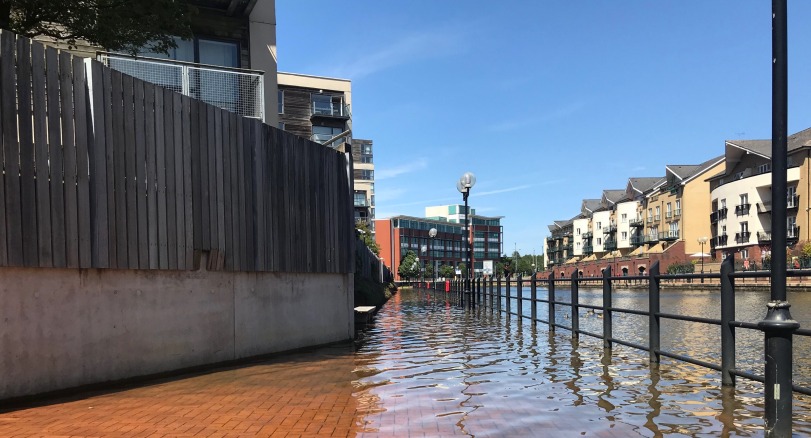High rise residents sick of paying sky-high service charges

Ted Peskett, local democracy reporter
Residents living in crumbling buildings at an apartment complex say they are sick of having to pay thousands of pounds in service charges.
Celestia, situated off Roath Basin in Cardiff Bay, was marketed to potential buyers after its construction in 2007 in “the most glossy possible terms” according to one resident.
However over the years people living there have allegedly found it to lack fire safety and claim they have seen chunks of render fall off buildings and watched as the sides of some blocks developed patches of what appears to be algae.
Leaseholders say they are currently expected to pay for the required remediation work through ever-increasing service charges.
£7,000
One woman who moved into Celestia about five years after it was built said she has had to pay £7,000 this year on service charges.
Ruth Wainwright, 73, said: “I can’t keep paying that sum of money. Can you imagine?”
Ruth said her management fees were about £3,000 when she first moved in with her husband, who has since died.
She added: “I am paying something like £600 a month and I have got a pension for my husband as well but it is a hell of a chunk for anybody to suddenly have to pay.
“There are younger people here who have got mortgages. How are they living?”

Internal compartmentation work, which is aimed at preventing the spread of smoke and fire in a building, took place between 2020 and 2021.
However residents argue that a lot more is required to put the apartment complex right and they have decided to take Redrow to court over who should pay for this.
There have been a number of instances over the years where chunks of render has fallen off buildings at Celestia.
Recalling a time when a section of render had to be pinned back after it was spotted coming away from one of the buildings Ruth said: “I didn’t see it straight away until these chaps came up. They were abseiling to do it.
“I went out on my balcony and I said: ‘What are you doing?’ and he said the rendering was coming away.
“When I leaned over and looked you could see that there was a gap.
“If a piece of that fell down first of all it would probably have fallen on those cars over there [in the car park].
“I wouldn’t have been very pleased if it was my car to start with. If it fell on somebody they would be killed.
“If you walk around… there are loads of places where chunks have come off and they have had to be patched up which then looks awful as well.
“Everything seems to be a bit shoddy.”
Sewage problems
Other issues residents at Celestia claim to have experienced include plumbing and sewage problems like leaking soil pipes, water ingress issues, and defective balconies.
The dock path on the eastern side of the site has also been known to regularly flood.
Another resident, Patrick Graham, lives on one of the upper floors at Vega House – the tallest of the apartment blocks at Celestia.
Patrick, 68, said: “It is constantly on your mind.
“If there was a fire… [you know that] in your own home you are careful about this, that and the other, but when you are in a block like that you have got all of these people living below you.
“It takes one of them to do something silly and that is it… and you can’t use a lift [in the event of a fire alarm] – you have got to walk down.
“My wife is waiting for a hip operation. It would take us an hour to get down at the moment until she gets that done.
“The fire appliances can’t even get up to the building. And then you have got the freeholders.
“If they are saying they own the property why aren’t they paying something? Along with the council, the fire brigade, and everybody else.
“Why is it us?”
Residents say they aren’t entirely sure how long it could take for the building to be fully repaired.
The expectation is that it could take years and some are worried about how long leaseholders could continue to put up with the high costs and uncertainty.

Forfeiture
One of the elected leasehold directors of the Celestia Management Company Limited, Mark Thomas, said: “There is every prospect that some leaseholders are going to find life increasingly difficult and the doomsday scenario is that some may face the prospect of forfeiture because they won’t be able to cope with all the increases.”
Mr Thomas said leaseholders’ battle with Redrow and the Welsh Government has already been going on for six years.
He added: “There is a real prospect that this is going to drag on for another three or four years because there is no work beginning as such and at Celestia we have been told that the procurement process might not be completed until Christmas and then there is a loose prospect of actual works beginning I think at the end of summer next year.
“There is a development in the Bay where they have had scaffolding up already for three years.
“People are looking through plastic.
“There is a real fear that this is going to drag on for several more years and you just wonder how long people can put up with this.
“People want to get on with their lives.”
A Redrow spokesman said: “We have signed the Welsh Government’s Pledge Deed of Bilateral Contract.
“In doing so we committed to remediating those buildings over 11m with life-critical fire safety issues in which we were involved going back 30 years.
“We continue to comply with all obligations under the deed of contract.
“We have provided significant financial support to the management company at Celestia.
“We have consistently said that we believe the housebuilding industry should play its part in resolving the issue of legacy fire safety in high-rise buildings and that the financial burden should not be borne by leaseholders.
“We have appointed expert consultants and we are working in close liaison with Celestia’s Management Company.
“We continue to move forward on the remediation of life-critical fire safety issues at Celestia.
“General service charges – relating to matters like utility costs, insurances, and general upkeep and maintenance of the buildings – are a matter for Celestia’s Management Company, which is run by resident representatives.”
Laing O’Rourke was the company behind the construction of Celestia.
Engaged
A Laing O’Rourke spokesman said: “Laing O’Rourke has engaged proactively with the developer, Redrow, and with Celestia Management Company Limited (CMCL), including attending the site and several meetings with Redrow, CMCL, and their lawyers.
“We have also responded to various requests for technical information to assist with CMCL’s investigations and risk assessments.
“However as legal proceedings have been issued we are unable to comment further at this time.”
The Building Safety Act 2022, which was produced following the Grenfell fire in 2017, is aimed at making fire safety regulations for new builds clearer and more robust.
Mr Thomas said the Welsh Government needs to enact sections 116 and 125 of the Building Safety Act into Welsh law to lift the responsibility of having to pay for remediation off leaseholders and give local authorities the power to seek remediation orders for developers.
Welsh minister for climate change Julie James announced in October 2022 that a number of major developers in Wales had signed up to the Welsh Government’s developers pact.
The pact is aimed at encouraging developers to address fire safety issues in buildings of 11m and greater in height.
However Mr Thomas said this does not go far enough.
He said: “In the last fortnight we had the first remediation act issued in England and there is an expectation now in the coming months that more of these remediation and contribution orders will be issued against developers and freeholders in England.
“The issue is that means leaseholders don’t have to try to pursue developers themselves with all the accordant risks and costs involved in litigating as we are.
“That has been a huge sticking point and we remain deeply concerned that Julie James has been pursuing what we call more of a light touch and a collaborative approach with developers.
“A lot of what she says is based on words such as: ‘I encourage other developers to do A, B, C and D’ whereas our view is words of encouragement are not enough.”
Audit Wales
An Audit Wales report published on August 1, 2023, highlighted a number of concerns over Wales’ ability to implement the Building Safety Act and called for the Welsh Government to provide greater clarity on how it will do this.
The report states that the Welsh Government is planning to make local authorities the building safety regulator for oversight of high-risk buildings.
However it is yet to set out how this will work and there are concerns that local authorities are not sufficiently resourced to carry out this function.
The report states: “Welsh Government officials we interviewed acknowledge that they have not been able to resource policy work as quickly as they would like and this has not been helped by the recent retirement of two key members of staff who have been central to driving the changes in Wales.
“Consequently many local authority officers noted a growing unease that
progress in Scotland is well ahead of England and Wales and England is
now advancing more rapidly than Wales.
“This uncertainty is adding to their already challenging operating environment.”
Timetable
A Welsh Government spokesman said: “We have developed a phased timetable for implementation of the Building Safety Act 2022 provisions which apply to Wales. This has been communicated widely within the industry and will start in the New Year.
“In addition to this we are working towards a bill to overhaul the system of building safety at the occupation phase of a building’s lifecycle.
“These proposals will establish a robust and coherent regulatory system, which will hold to account those responsible for the building safety of relevant buildings, and ensure accurate, up-to-date, and consistent information is held on all in scope multi-occupied residential buildings.”
Residents at Celestia also think Cardiff Council should be putting more pressure on the Welsh Government to bring in legislation.
Referencing a meeting which took place in 2020 between leaseholders and politicians, including council leader Cllr Huw Thomas, Mr Thomas said: “I remember asking about Celestia and again we asked questions about how on earth could this situation happen.
“Because most people’s expectation was that you couldn’t build this rubbish and that there were building controllers who came around and inspected developments but clearly that wasn’t the case under what was then a heavily deregulated regime.
“We were advised that Cardiff Council didn’t have any documents from our building in 2007 because there was nothing stored digitally and they then also told us that there was no-one left working in the planning department from 2007 which we found extremely strange.”
Cross party group
Former leader of the Liberal Democrats group at Cardiff Council, Cllr Rhys Taylor, attempted to launch a cross-party group at the local authority aimed at improving fire safety in buildings across the city.
However Mr Thomas said this didn’t succeed after the council’s cabinet member for housing and communities, Cllr Lynda Thorne, and another council official failed to turn up to the meetings.
He said: “Subsequently that forum was abandoned and again that just, to many of us, highlighted the largely indifferent approach that Cardiff Council has offered to victims in the Bay.”
A spokesman for the Cardiff Labour group said Cardiff Council has supported residents in whatever way it can and maintained that private developers have a “moral obligation” to ensure the safety of residents.
The spokesman said: “The Labour Group has been consistently clear that the cost of remediating buildings affected by the cladding scandal should not be borne by residents but by the companies responsible.
“Whilst the council’s powers in relation to private developments is limited we have supported residents in whatever way we can, both as a council administration and as local councillors supporting our constituents, and lobbying the Welsh and UK Governments for action.
“Cardiff Council has acted decisively, going above and beyond basic standards to ensure the safety of residents in high-rise properties owned by the council – we believe private developers have a moral obligation to do the same at the buildings they constructed.
“We continue to believe that the appropriate way to scrutinise the council’s actions on these matters is via the properly constituted scrutiny committee – not an APPG-style arrangement that has no formal powers with a self-appointed Chair.
“The cabinet member and relevant council officers have appeared regularly before the CASSC scrutiny committee to give evidence on the council’s response to the cladding crisis.
“This is a complex issue created by failures in the private sector and as such we believe a cross-party, cross-government approach is the best way to secure a positive outcome for affected residents.
“It is an unhelpful distraction therefore that some are seeking to make political capital from this issue.
“If there are questions being asked about how the council acted in the mid-2000s then they are perhaps best answered by members of the Liberal Democrat administration that ran the council between 2004 and 2012.”
Support our Nation today
For the price of a cup of coffee a month you can help us create an independent, not-for-profit, national news service for the people of Wales, by the people of Wales.





